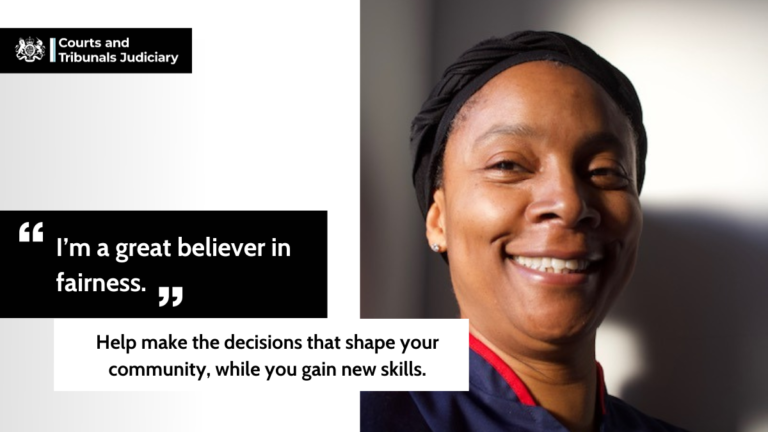The importance of representation in the magistracy

Pauline is a Community Services Matron from Leicester and has been a magistrate for more than 10 years. She joined the bench as she believed that there needed to be better representation for people from ethnic minorities, and as a black woman she wanted to help with that change. We spoke to Pauline about her experiences as a magistrate.
Why did you volunteer to become a magistrate?
I had an interest for a very long time but I assumed you had to be retired with lots of time on your hands to become a magistrate.
I attended an awareness evening where all my assumptions got turned on their head. I realised you can be employed, you can be a mum who is working part-time, you can be of any background and apply to become a magistrate. I’m a healthcare professional, with over 38 years NHS experience and work in partnership with various agencies in the community.
How important is it to you to have representation in the magistracy?
I think it really is important. I wanted to make a difference, to be representing black women on the panel. So, when defendants do come into court, hopefully they’ll have a sense of being listened to and dealt with fairly. For me it was about that representation in the community – being a woman, and also being an African Caribbean woman as well.
When you’re on the bench, you have a Presiding Justice and two wingers. I work as a winger a lot of the time. When we review the information, all our views are taken into consideration. It’s not just the chairperson that makes the final decision; we do that as a bench of three.
Sometimes we come across situations that are unfamiliar. If it’s a health-related subject, I can bring my expertise in and share from a professional background and advise whether situations wouldn’t work like that.
As a magistrate with a healthcare background, I can bring more information to conversations and add deliberations to enhance the decision-making. Others also make decision-making much more interesting. It’s teamwork.
Being the new kid on the block, the first day in the court once you’re appointed is very daunting; you feel like you know nothing. I had that feeling but I was warmly welcomed by my mentor and by other bench members. They took extra special care of me to make sure I understood everything being said. You can ask questions if there’s still something you don’t quite understand. Everybody treats you as an individual, with respect, and listens to what you have to say as well. It’s been a colourful, diverse experience – and that’s probably why I keep doing it, because I enjoy it so much.
What did your family and friends think about you becoming a magistrate?
My family were really pleased. Some members of my family and friends assumed you have to be a qualified lawyer. But I’ve managed to do a lot of myth-busting. You can be an ordinary person, from an ordinary background in the community, and become a magistrate.
My family have been extremely supportive and very proud. It’s been lovely.
What are your main responsibilities and how do these align with your values?
I’m a great believer in fairness. When I’m on the bench as a magistrate, it’s important to follow magistracy guidance and the law. But it’s also important to apply your analysis to the situation and person you’re dealing with and come to a fair conclusion. For example, if the person has been found guilty, you apply a fair attitude, you speak to them with respect and compassion.
‘I’m serving the community’, that’s the way I see it.
In terms of my core values, in my vocation, I serve people, I look after people, I advise and try to empower individuals. The magistracy in that sense does align with my core values because I’m still looking after my clients or treating the community in the same way and applying the same approach. I do believe I’m making an impact.
What one piece of advice would you give to someone considering becoming a magistrate?
I’d advise to look at the magistrates website and find vacancies in your area or register your interest. Also talk to people who you know are serving as magistrates and ask questions. Jump in with two feet and apply.
Sometimes you need to be able to give in order to receive.
Yes, it’s voluntary work and I give up a day, roughly, a month (13 days for five years is my minimum number of days for sittings); But I receive an awful lot in return. I gain communication skills, learn, meet new people, and appreciate what people think from different perspectives. I gain so much more than I lose.
If we want to make a difference, a system that is user-friendly, relevant, and current for today’s society, then we do need younger people, under 50s, and people from all ethnic minorities to be recruited to become magistrates. We’ve got a good representation of women nationally now, but we need representation from all walks of lives. Magistrates should reflect the community they’re representing.
Back in the day, my assumption was that it was predominately white, male, middle class people who became magistrates. But we need to turn that perception around. If you feel the system isn’t working effectively, then you need to be in it to make a change, influence and contribute. Even one decision in a fair manner is better than no decision at all.
